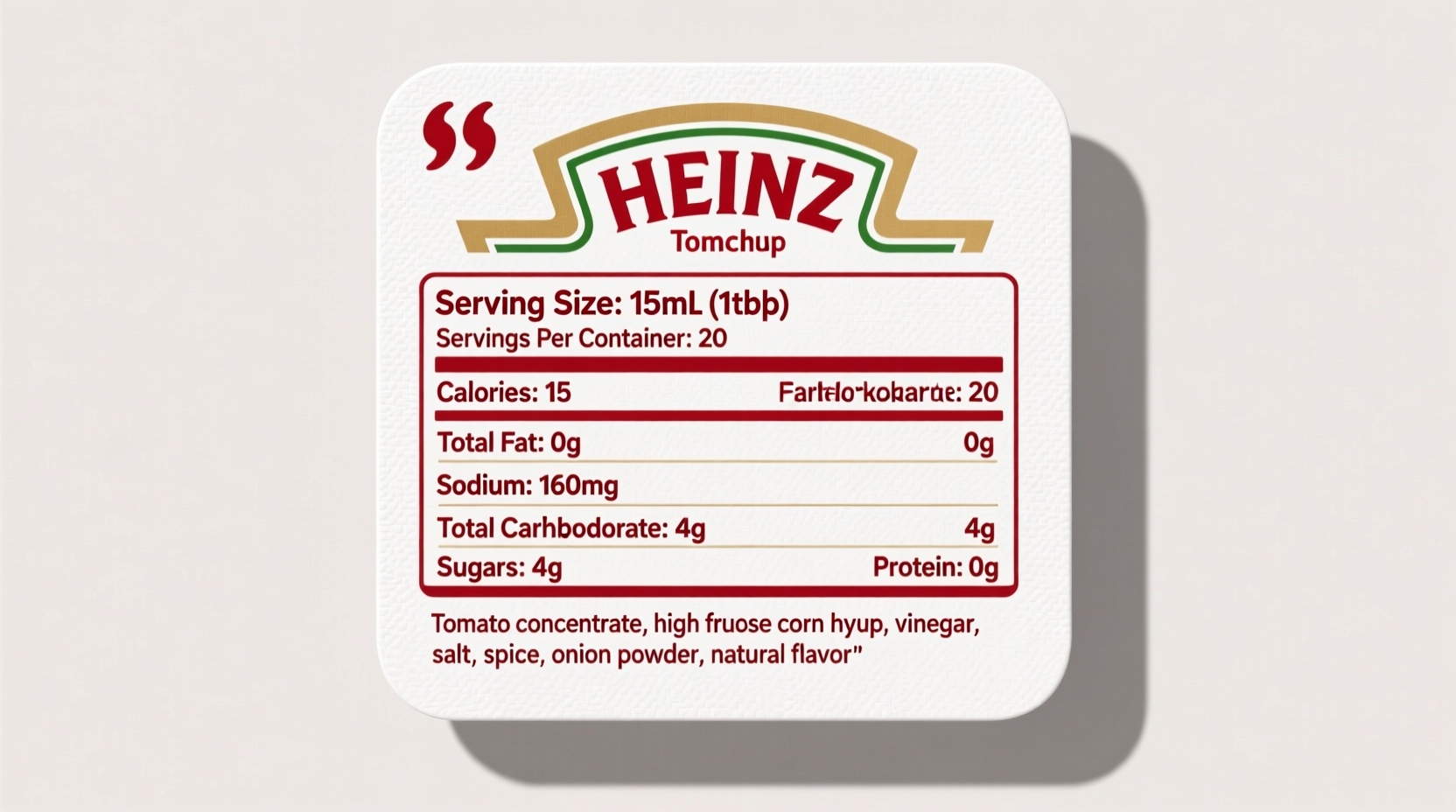Decoding the Heinz Tomato Ketchup Nutrition Facts Panel
When you reach for that iconic glass bottle, understanding exactly what's inside matters for your dietary choices. Heinz Tomato Ketchup maintains a remarkably consistent nutritional profile that has remained stable for decades while adapting to evolving consumer preferences. Let's break down what those numbers really mean for your daily nutrition.
Complete Nutrition Facts for Heinz Tomato Ketchup
| Nutrition Facts | Per Serving (17g) | % Daily Value* |
|---|---|---|
| Calories | 15 | |
| Total Fat | 0g | <1% |
| Sodium | 140mg | 6% |
| Total Carbohydrate | 4g | 1% |
| Sugars | 4g | |
| Vitamin C | 2% | 2% |
*Percent Daily Values are based on a 2,000 calorie diet. Your daily values may be higher or lower depending on your calorie needs.
Understanding Key Nutritional Components
That familiar red squeeze bottle contains more than just tomato flavor. Let's examine what each component means for your health:
Sugar Content Explained
With 4 grams of sugar per tablespoon, Heinz Tomato Ketchup contains approximately 1 teaspoon of sugar. This comes from both naturally occurring sugars in tomatoes and added sugar. According to the FDA's guidance on added sugars, this represents about 8% of the recommended daily limit for added sugars for a 2,000-calorie diet. The sugar serves multiple purposes: balancing acidity, enhancing flavor, and contributing to the characteristic texture.
Sodium Levels in Context
The 140mg of sodium per serving represents 6% of the recommended daily value. While this might seem significant for a condiment, it's actually moderate compared to many processed foods. The American Heart Association recommends no more than 2,300mg of sodium daily, with an ideal limit of 1,500mg for most adults. When used sparingly as intended (1-2 tablespoons per serving of food), ketchup contributes minimally to your daily sodium intake.

How Heinz Compares to Other Condiments
Understanding where ketchup stands relative to other popular condiments helps put its nutritional profile in perspective:
| Condiment (1 tbsp) | Calories | Sugar (g) | Sodium (mg) |
|---|---|---|---|
| Heinz Tomato Ketchup | 15 | 4 | 140 |
| Barbecue Sauce | 50 | 11 | 180 |
| Mayonnaise | 90 | 0 | 90 |
| Mustard | 5 | 0 | 55 |
| Hot Sauce | 5 | 0 | 150 |
This comparison shows that while ketchup contains more sugar than some alternatives, it's significantly lower in calories than creamy condiments like mayonnaise. The tomato base provides natural lycopene, an antioxidant not found in most other condiments.
Evolution of Ketchup Nutrition Over Time
Heinz has maintained remarkable consistency in its ketchup formula since the early 20th century, with only minor adjustments to meet changing regulations and consumer preferences:
- 1920s-1980s: Original formula contained higher sugar content (approximately 5g per serving) with no high fructose corn syrup
- 1980s-2000s: Transitioned to using high fructose corn syrup as primary sweetener while maintaining similar sugar levels
- 2010s: Removed high fructose corn syrup in response to consumer demand, returning to sugar as the primary sweetener
- Present: Current formula contains 4g of sugar per serving, with no artificial preservatives or colors
According to historical records from the FDA's historical nutrition documentation, these changes reflect broader industry trends while maintaining the product's distinctive taste profile.
Practical Usage Guidelines for Different Dietary Needs
How much ketchup can you reasonably include in various eating patterns? Consider these practical guidelines:
- Standard diets: 1-2 tablespoons per meal fits comfortably within daily sugar and sodium limits
- Diabetes management: Limit to 1 tablespoon per serving (4g sugar) and account for this in your carbohydrate counting
- Low-sodium diets: Contributes approximately 6% of daily sodium limit per serving - use moderately if on strict sodium restriction
- Weight management: At just 15 calories per tablespoon, it's a low-calorie flavor enhancer compared to creamy alternatives
Nutrition professionals from the Academy of Nutrition and Dietetics note that condiments like ketchup can help make vegetables and proteins more appealing, potentially increasing overall vegetable consumption - a significant benefit that offsets the modest sugar content for most people.
Reading Between the Lines: What the Label Doesn't Say
The nutrition label provides essential data, but understanding what's behind those numbers adds valuable context:
- The 2% vitamin C comes from tomato concentrate, providing a small but meaningful contribution to your daily needs
- Lycopene content (not listed on the label) is approximately 2.5mg per serving - a powerful antioxidant associated with heart health
- The absence of fat and protein reflects ketchup's role as a flavoring agent rather than a significant macronutrient source
- No artificial preservatives are needed due to the natural acidity from vinegar and tomatoes
Research published in the Journal of Agricultural and Food Chemistry confirms that the processing method used for Heinz ketchup actually increases lycopene bioavailability compared to raw tomatoes, making it a surprisingly beneficial source of this important nutrient.
Common Questions About Heinz Ketchup Nutrition
Based on frequent consumer inquiries, here are answers to the most common questions about Heinz tomato ketchup nutrition:











 浙公网安备
33010002000092号
浙公网安备
33010002000092号 浙B2-20120091-4
浙B2-20120091-4